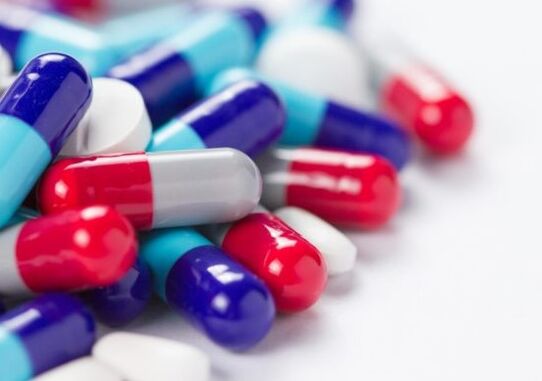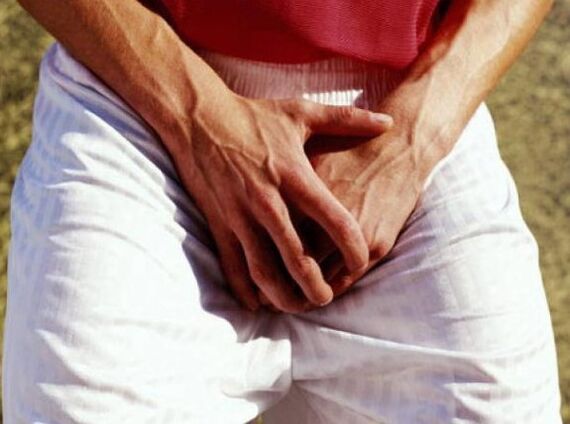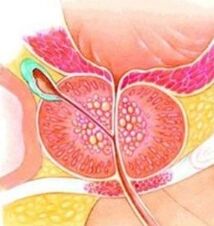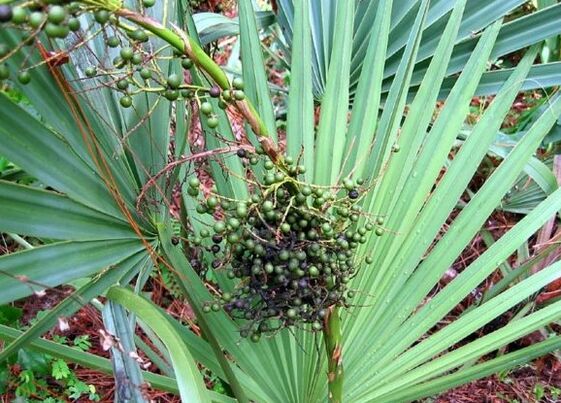Prostatitis is an inflammatory disease of the prostate gland that develops against the background of exposure to several pathogenic factors at one time (such as urinary tract infections, stagnation of secretory fluid in the seminal vesicle, impaired venous outflow in the vessels of small pelvis, etc. ). The polyethiological nature of prostatitis determines the need for a comprehensive approach to treatment. As a rule, therapy protocols consist of several medicines aimed at eliminating the infectious pathogen (in the case of bacterial inflammation), relieving the inflammatory process, normalizing venous and lymph-peaks, as well as eliminating residual inflammatory phenomena for the prevention of repeated recurrences.

Drug therapy for prostatitis remains one of the main and affordable methods of outpatient treatment. At home, one can use rectal suppositories, tablets, capsules. The iron and gel for inflammatory diseases of the prostate are rarely used because of the inconvenience of their administration. Injections and installs (introduction of antiseptics, antibiotics and ozonated solutions directly into the prostatic part of the urethra) are performed in the clinic's office or in a urology hospital.
Cheap antibiotics (basic therapy)
Antibiotics are medicines that can suppress the growth of living microorganisms in fairly low concentrations and cause death. Medicines in this group are required for the treatment of infectious prostatitis, which represents up to 78% of cases of total men with inflammatory diseases of the prostate. Antibiotic therapy with bacterial prostatitis and prostatostitis (combined inflammation of the prostate glands and bladder) has its own characteristics that should be taken into account when choosing an effective treatment regimen.
- It is necessary to take antibiotics in any form of infectious prostatitis for at least 4 weeks. This applies even to these drugs, standard therapy, which is usually 7-10 days.
- The sensitivity of the microorganisms, which most often cause inflammatory processes in the prostate gland (serotype of Escherichia coli O157/H7, faecal enterococcus, etc. ), for penicillin medicine quite low, as these bacteria have a membrane of a solid capsule. For this reason, drugs in a group of semi -synthetic penicillins are prescribed for infectious prostatitis only in combination with other antibiotics.
Pay attention! Patients with severe immunosuppression (inhibition of immune response against the background of interaction with non -specific factors), especially need the proper selection of an adequate dose of antibiotics, which would provide a pronounced bactericidal effect. Suicide in severe forms of immunodeficiency can be not only ineffective but also dangerous to health due to a high risk of superinfection.
Cheap bactericidal drugs

When using antibiotic therapy, it is important to achieve a bactericidal effect, which consists not only in stopping the life of pathogens, but also in their death. For the treatment of prostatitis, especially in the case of recurrent or chronic course, it is advisable to use maximum therapeutic doses with a duration of therapy for at least 28 days (for oral dosage forms).
They are more commonly used to treat prostatitis, antispasmodics based on papal hydrochloride are used 1%. Papaverine teachers are recommended for use during exacerbation, as well as for chronic pelvic pain syndrome. They are used rectally in the form of suppositories for 1 candle 2 times a day. The recommended course of treatment is 10 days.
Urodynamics correspondents based on the hood of animal prostate
Excuse prostates (extract) are a polypeptide extract that is extracted from the dried tissues of the prostate gland of young Gobi, which have reached sexually mature and are ready for insemination (bulls at the age of 7-10 months). The preparations based on such an extract are indicated only for the treatment of chronic forms of prostatitis (stagnant, aseptic, chronic bacterial and asymptomatic prostatitis) or prostate adenomas in 1-2 stages.
Treatment with Drugs of this Group, Which Are Produced in the Form of Candles, Tablets (Capsules) and Lyophilisate, Gives A Sufficiently Stable Effect in Approximately 31. Rather High Indicator That Determines the Feasibility of Including the Extract of the Scheme of Comprehensive Treatment of Inflammatory Diseases of the Prostate Gland. The therapeutic effect of the preparation of animals is manifested by the following urodynamic improvements:
- normalization of the secretory activity of the prostate glands;
- improving the leakage of prostate secretion and eliminating stagnation in the prostate and pelvic organs;
- Reduction of edema;
- Prevention of aggregation (mergers) of platelets and blood clots in the vessels of the gland;
- Elimination of leukocytes infiltration to the focus of inflammation.

Prostate extract also has a positive effect on metabolism and metabolism in the tissues of the gland, chemical and rheological indicators of prostatic secretion.
Serenoa Movetur Medicines Extract
Serenoa Movetur (Palm, Creeping Palm) is a medicinal plant, the unique properties of which in the treatment of inflammatory diseases of the genitumal system in men were discovered for the first time by the ancient Indians. To date, palm sabal extract is used by the methods of the drug based on evidence as an auxiliary tool for the treatment of inflammatory pathologies of the prostate gland (including DHCH).
According to their pharmacological properties, medicines prepared on the basis of a creeping palm extract are related to drugs that correct urodynamic indicators and help to detect metabolic processes in the prostate gland. Like the prostate extract, these drugs have a fairly high price, so patients with disabilities should provide all the information about more affordable drugs in this group.
In hospitals, dry Sabal Sabal extract can be used in the form of injections and infusions.
Microcirculation
Angio-transceptors and microcirculation adjustments are necessary for stagnant forms of prostatitis, which develop as a rule, against the background of a sedentary lifestyle and hypodynamic disorders. The agents of this group have vasodilatory and angioprotective effects, prevent platelet aggregation, improve blood flow and lymphatic fluid into the blood vessels of the microcirculatory canal.

Pay attention!If it is necessary to perform diagnostic manipulations requiring the use of invasive methods, cancel the drugs that divide the blood at least 3 days before the examination.
What other medicines have been prescribed for the treatment of prostatitis?
The combination of medicines, the use of which will be effective and appropriate in any case, is determined by the doctor. In most cases, drugs in the NSAID (Diclofenac, Ketoprofen) drugs are used to stop the inflammatory process. At the recovery stage, the use of products similar to carnitine, vitamin and vitamin is indicated. Diuretics are prescribed for abundance of urinary tract in patients at high risk of ascending infection. The use of plant fees with diuretic and anti -inflammatory effects has also been shown.
During acute inflammation, analgesics and antipyretics are prescribed to eliminate heat and reduce pain. Alpha-blockers are prescribed to patients with pronounced urinary disorders accompanied by pain.
What to do with chronic inflammation: helpful tips
In chronic stagnation, bacterial or aseptic prostatitis, it is important not only to take prescribed medicines according to the recommended scheme, but also to feed properly, as well as to correct the lifestyle in such a way as to eliminate all provocative factors.
- In the diet of men suffering from prostatitis, there should be enough protein, zinc, selenium, chrome, as well as some vitamins involved in the secretion of semen. It is useful in the daily menu to include seafood and fish, nuts, seeds, fruits, green, eggs and dairy products.
- In order to prevent relapse, it is necessary to control the cholesterol level. It is important to monitor the fat content of the diet and to avoid the increased use of fatty products frequently.
- Sexual life must be regular. Long -term abstinence contributes to stagnation of prostatic secret and the development of stagnant prostate inflammation. In a healthy person, a period of abstinence from intimacy should not exceed three days.
- Insufficient motor activity is one of the main causes of inflammatory changes in prostate tissues. In addition to special therapeutic gymnastics, men are advised to do morning exercises, go a lot and regularly visit the pool.

Further observation after the basic stage of treatment involves consultation and checking the urologist at least 3-4 times a year, as well as the passage of laboratory diagnostics (urine examination, prostate secretion) and ultrasound of the prostate gland and bladder.
Medicines are the basis of the basic therapy of prostatitis and other inflammatory diseases of the genius system. The pharmaceutical industry offers a fairly large choice, so you can choose cheap and effective medicines of any form and stage of prostatitis. Only the attending physician should perform any meeting, taking into account the dynamics of the disease and the individual characteristics of the patient. Self -medication, especially medicines with antibacterial effects, is unacceptable due to a high risk of superinfection.























